- Home
- Alison Weir
Anna of Kleve, the Princess in the Portrait Page 5
Anna of Kleve, the Princess in the Portrait Read online
Page 5
It was now January, and his condition had worsened. The doctors kept shaking their heads and saying there was nothing they could do.
Mutter went about wraithlike, trying to convince herself that this was God’s will.
“He has gone from me, the man I loved, and it is too painful to be with the shell of him that is left,” she said.
Anna’s heart bled for her parents as she stood by her father’s bed and looked down on him. He was sleeping fitfully, a trickle of drool running down his grizzly chin. Was this wasted husk really the debonair chevalier who had dazzled his subjects in his flamboyant satins and velvets and feathered bonnets?
“It will not be long now,” Dr. Cepher murmured to Mutter. She crossed herself and sent for Wilhelm.
For months now, Wilhelm had been duke in all but name. At twenty-two, he had grown to be of middle height, with good looks, a muscular build, and a bushy dark brown beard that matched his hair, which he wore cropped to the ear. He was as serious and humorless as ever, but winning praise for his courtesy and his virtue. Wilhelm would never be caught in a tavern or in the arms of a whore, but Anna was sometimes irritated by his sanctimonious manner and unshakable belief that he was right.
And yet, watching him now, as he sat by Vater’s bed, his angular features taut, his fine eyes clouded by tears, she had to concede that he had the makings of a great ruler. He was impressively learned, with a reputation among the princes of Germany for being the most fluent in French, and the most accomplished in Italian manners. And he was determined to make Kleve respected throughout Christendom.
It would all be his soon—Kleve, with its duchies and territories. Anna had long been wary of him. If he discovered her secret, she would suffer for it. Once—she had never forgotten it—hearing that the sister of one of the ducal councillors had abandoned her husband, Wilhelm had exploded in rage and said that, if it had been his sister, he would have killed her. Anna prayed he would never find out about the existence of his unknown nephew, who—she heard from Mother Lowe, all too infrequently—was thriving in Solingen and desired to be a swordsmith like his adoptive father. A swordsmith—and he the grandson of the Duke of Kleve! Missing him was a dull ache she lived with daily.
His face pained, Wilhelm gazed down at his dying father. “What a tragedy. He was the most peaceable ruler of his day.”
As they left the stuffy bedchamber and opened the windows in the gallery beyond, letting in the clean, cold air, Anna kept her voice lowered. “Mutter thinks Vater’s illness is a punishment from God because he rejected the authority of the Pope and the Church of Rome. She said it was never the will of God for the Church in Kleve to be placed under the control of the state.” Goaded by grief, their mother had been unusually outspoken.
“Mutter would think that,” Wilhelm observed. “She is a devout daughter of the Church of Rome. But Vater believed he was doing what was right. And, unlike the King of England, who broke with the Pope just because he wanted a new wife, Vater acted on a principle, and took care to maintain as friendly relations as were possible with the Vatican. I shall not change things, whatever Mutter says.” He looked down his long nose at Anna.
She raised her eyebrows. It was no secret that Wilhelm was a reformist, like Vater, and a friend and protector to his Lutheran subjects, even inviting one to preach at court; but he was a Catholic at heart, and orthodox, and many expected him to heed his mother’s urging and return in obedience to Rome. He often said himself that he took no decision without consulting Mutter, and Anna anticipated that he would do so in regard to religion. Whatever he decided, Mutter would not challenge him; as it had been with her husband, so it was with her son.
Since Wilhelm had assumed sovereign power, Anna had felt the constraints tightening. He was zealously protective of his womenfolk, and far more severe in his views on female decorum than Vater had been. Mutter was strict, but Wilhelm was stricter. It had already been made clear that, until they married, Anna and Emily would stay secluded with their mother in the private apartments, except on state occasions. Yet, since her betrothal had been broken four years ago, there seemed no prospect of Anna marrying. She was twenty-three now, and no other prince had asked for her hand. Even if they did, Wilhelm would probably turn them down. His treasury was depleted; how could he afford a dowry?
Sitting in Mutter’s chamber, sorting through embroidery silks with Emily, Anna wondered what her life would have been like if she had married Francis of Lorraine. She had not felt sad when Vater told her that the precontract had been annulled, a thing easily done as neither she nor Francis had been of the age of consent when it was made. No, all she had felt was relief. Once upon a time, she would eagerly have begun hoping anew that she would be allowed to marry Otho, but that was years in the past. She still kept his ring locked away in the little casket that contained her few personal treasures; even after she had heard he was married, she had not been able to bring herself to get rid of it. She had not seen him since that fateful visit, and sometimes wondered what he was like now, and if he ever thought of her. When she thought of him, it was as a poignant memory, and with gratitude that she had at least known the wonder of physical love—especially since she might now never know it again.
Maybe the breaking of her betrothal had been part of God’s plan to ensure that she was here in Kleve when her mother needed her. Maybe He had saved her from becoming embroiled in a war. For, much to the impotent rage of the Duke of Lorraine, the childless Duke of Guelders had been persuaded that his duchy would preserve its independence more effectively in the hands of Wilhelm than in those of Francis, and had designated Wilhelm his heir. This was why there had no longer been any reason for Anna to wed Francis. And when Duke Charles had died last year, Wilhelm had become duke of Guelders, further expanding the territories controlled by Kleve.
But the Emperor had been furious. Guelders, he had announced, was rightly his. People were saying he would have it whatever it cost him.
“Of course he is angry,” Wilhelm had said, his eyes gleaming. “He knows that possession of Guelders gives me great strategic advantages. He now has to cross my dominions to get to his duchy of Burgundy. Hitherto, Kleve was landlocked, but now we have access to the Zuyder Zee and the North Sea, which increases our military potential.”
There might yet be a war. Even if Anna had married Francis, and they had taken possession of Guelders last year, the Emperor might still have objected, and she could have been caught up in the conflict.
She wished she had some marriage in view. She could not help envisaging what it would be like, sharing physical pleasure with a husband she could love. Many times, she had been tempted to commit what the Church taught was a mortal sin, which could consign her to damnation if she did not confess and repent. But she shrank from mentioning such a thing to Father Gerecht, or to any other priest, for how could they understand, being vowed to celibacy? They would surely be shocked at a woman admitting to such base desires. Moreover, repentance meant resolving never to commit the sin again, a commitment she feared she might not sustain. St. Paul had said that it was better to marry than to burn, and she understood exactly what he meant; but with no prospect of marriage in sight, all she could do was burn.
Anna was alone when Wilhelm came to the ladies’ chamber at Düsseldorf in the last week of January. Mutter was in the chapel, and it was Emily’s turn to sit with Vater.
Anna poured some wine. Wilhelm accepted it with a nod and sat down.
“I have some news that concerns you,” he announced. “Sybilla has written to say that envoys from the King of England have arrived at the court of Saxony and approached the Elector’s Vice Chancellor touching the possibility of an alliance with Kleve. Vater’s health is known to be failing, and they know the Elector to be my firm ally. In this matter, he can be trusted to do right by me, because he wants to draw Kleve into the Schmalkaldic League. You will remember his Vice Chancellor, Franz Bur
chard, from his visit two years ago. He has been in England, and knows the people. He’s a good man, sound and reliable. We can count on him to handle the matter properly, and discreetly.”
“How does this concern me?” Anna asked, sipping her wine.
Wilhelm straightened in his chair. There was a rare air of suppressed excitement about him. “It seems that King Henry’s Principal Secretary, Lord Cromwell, has recommended you as a bride for the King, and that the King has intimated his interest in proceeding with an alliance. Anna, you could be queen of England!”
For a moment, Anna was speechless, then she found herself trembling. No. No! Henry of England’s matrimonial career had fueled the gossip of Christendom for years. He had had three wives, and all had died miserably, the first, rumor had it, poisoned, the second put to the sword, and the third in childbed, only the year before last. By all accounts, he was a tyrant, both in the bedchamber and out of it.
“You don’t seem very pleased,” Wilhelm observed, looking a little deflated.
“Do you wonder?” she asked. “What price a crown, if the man is a monster?”
“Some would say he has been unlucky. His first two queens failed to give him an heir; the third died doing so.”
“But he had the second beheaded! Would you have me risk such a fate?”
“She was a strumpet who betrayed him with other men. You, Anna, are cut from different cloth. No breath of scandal would ever attach itself to you.”
Anna felt her cheeks grow hot with guilt. “I should hope not,” she said, inwardly in turmoil. What if the terrifying Henry of England discovered she was no virgin?
“I do not want to marry this King,” she declared.
“But, Anna, an alliance with England will be of great benefit to Kleve,” Wilhelm protested, severe. “It is your duty to aid your country by making a good marriage.” It was clear that he was already set on it. With a sinking heart, Anna realized she had little choice in the matter.
“But why does England want to ally itself with Kleve?” she asked.
“Let us take a walk, and I will explain.”
They fetched cloaks and gloves, and Wilhelm led Anna down to the gallery and loggia that fronted the quayside, where they stood watching the boats sailing along the Rhine or offloading their goods onto the wharves.
“The Pope has recently excommunicated King Henry,” Wilhelm revealed. “Consequently, those two devout sons of the Church, the Emperor and the King of France, have allied themselves to each other, leaving him isolated. England is not as powerful as the Empire or France, but until recently, by allying itself to one or the other, it has maintained the balance of power in Christendom. Henry has long been in negotiations for a marriage with the Duchess of Milan, the Emperor’s niece, but this new pact between Charles and King François has wrecked them. The King is most put out; he is preparing for war and seeking other friends, and another bride. He needs an ally who will support him against his enemies; an ally bound by the ties of kinship.”
Reluctantly, Anna found herself understanding why King Henry was attracted to Kleve, which was one of the foremost principalities of Germany, and able to command a great army.
“An alliance between England, Kleve, and our friends, the Protestant German princes, would tip the balance of power in Europe in England’s favor once more,” Wilhelm said, indicating that they should move on, as the wind was chilly. Anna followed him through a door in the wall that led to his garden. “As you know, the Protestant states of Germany are thorns in the Emperor’s side, resisting his attempts to enforce the Catholic faith throughout the Empire; an alliance between them and England would divert Charles from any thought of joining with France to make war on Henry. You can see why the King is keen to ally with us and marry you. Lord Cromwell, his Majesty’s chief adviser, is pushing for the match. He is a reformist, like Vater and myself.”
Anna paused by a sundial, tracing its pattern with her finger. It sounded as if the King too was resolved on the matter. What good would it do her, a mere woman, to protest?
“You are thoughtful, Schwester,” Wilhelm said, coming to stand beside her. “It is a great match. You would be a queen.”
“I would be in danger.”
He sighed. “Not while I am here to protect you.”
“The Emperor, for all his might, did little to protect his aunt, Queen Katherine, when King Henry set her aside!”
“I am not the Emperor. And, to be fair, King Henry’s fear of Charles invading England made him stay his hand against Katherine. Anna, I always knew that your virtue and your sweet looks would get you a good husband. The King will love you, never fear. Besides, he needs my friendship; thus you can be assured that he will never mistreat you. Above all, we need this alliance. We too are threatened by this new pact between France and the Empire. If François were to back Charles’s claim to Guelders, we would have a war to fight. With English aid, we can win it!”
Against Wilhelm’s zeal, the will of King Henry, and the threat to her country, Anna knew herself powerless. She made a final attempt to save herself from the fate that was being thrust upon her.
“Could not the King marry Emily?” As soon as the words were out, she hated herself for uttering them. How base she was, wishing upon her sister a marriage she herself found repellent!
“You are the obvious choice, Anna. As the elder of my sisters, you will inherit Kleve if both I and Sybilla die childless. Sybilla has her three boys, of course, but the King, of all people, has good reason to know that young children can die of any number of unhappy mischances.”
Anna crossed herself. “Heaven forbid!”
“Amen!” Wilhelm said fervently, taking her arm and steering her back toward the door. “While King Henry thinks he has a chance of gaining Kleve through you, you will always be his first choice.”
Anna turned to him. “What would Vater do in this matter?”
“The same as I am doing,” Wilhelm said firmly. “He would be for the alliance.”
* * *
—
Anna was watching over Vater, praying he would wake up and be himself again, if only for a few moments. If he knew that the peace he had brought to Kleve was under threat, he would be appalled; but would he give his daughter to a tyrant as a remedy? She believed he would not, despite what Wilhelm had said.
But Vater did not wake. He was oblivious to the world around him, almost with the angels.
Sadly, Anna stood up, straightened the counterpane, and poured some cordial that would, most likely, never be drunk. Then she went to find Mutter.
Mutter knew all about the discussions that were going on in Saxony.
“I admit, I am torn,” she said, as they settled to embroidering the opposite ends of an altar cloth. “It would be a great alliance for Kleve. But I shrink from giving my daughter to an excommunicate whom all true Catholics must revile, for his apostasy and his morals. When the Duchess of Milan turned him down, she said that, if she had two heads, one would be at his Grace’s service! How I applaud her!”
Hope began to flower in Anna. “Have you said this to Wilhelm?” she asked. Wilhelm always heeded what Mutter said.
“I told him that he must decide. Even though I approve of the alliance, I will not be a party to your marrying that man.”
There was no hope, then.
The Elector had written to Wilhelm. King Henry wanted to know if both dukes of Kleve, father and son, still bore any allegiance to the Bishop of Rome, as he was pleased to call the Pope; were they of the old Popish fashion, and, if so, would they be inclinable to altering their opinions?
“I think we can safely satisfy the King on that score.” Wilhelm smiled at Anna. “And on another too, for his ambassador was asking discreetly about your beauty and personal qualities. He wanted to know all about your shape, stature, and complexion, your learning, what activities you e
njoy, and how you conduct yourself.”
Anna felt herself growing hot. “My shape? Isn’t that rather indelicate? Bruder, I do hope you will not answer to that!”
Wilhelm shrugged. “Anna, when princes cannot meet their prospective brides in person, they must rely on the descriptions sent by ambassadors, and on portraits. The King has asked for one to be sent to him.”
Anna was fuming. “So this vitally important alliance hangs on his liking my face, my figure, and my behavior! Of course, it doesn’t matter what I want, or if I have preferences in regard to the kind of man I shall wed; I have to marry for the good of my country, never mind that the King is a vile man!” She was shaking with indignation.
“Calm yourself, Schwester,” Wilhelm said, getting up from behind the table and pulling out a stool for her. “Nothing is decided yet. In fact, I think I am going to stall for a pace.”
She was astonished. “Why?”
“I dislike the attitude of the English. Their ambassador is fencing with us. The Elector complains that Henry will not ask outright for you; rather, it seems, they mean to prod us into offering you to him, which my pride forbids, for it is the man’s part to play the suitor. His envoys act as if your marrying their King is the noblest and highest honor that could come to the House of Kleve. He must be seen to be conferring a great favor on us.”
“Then you are right to stall.” Anna seethed. “I have never felt so insulted!”
* * *
—
Vater’s death in the first week of February was a merciful release, but despite having long been expected, it brought great grief in its wake. Mutter donned deepest black, and a lawn Stickelchen like a nun’s wimple, and withdrew to the chapel to pray for Vater’s soul. Anna and Emily knelt behind her, bereft and weeping copiously.

 Richard III and the Princes in the Tower
Richard III and the Princes in the Tower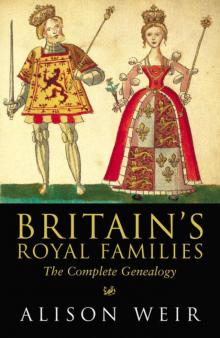 Britain's Royal Families: The Complete Genealogy
Britain's Royal Families: The Complete Genealogy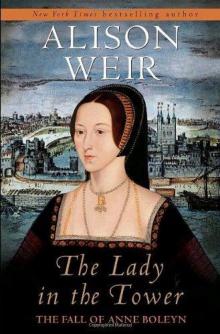 The Lady in the Tower: The Fall of Anne Boleyn
The Lady in the Tower: The Fall of Anne Boleyn Six Wives of Henry VIII
Six Wives of Henry VIII Elizabeth of York: A Tudor Queen and Her World
Elizabeth of York: A Tudor Queen and Her World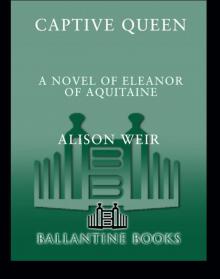 Captive Queen
Captive Queen Innocent Traitor
Innocent Traitor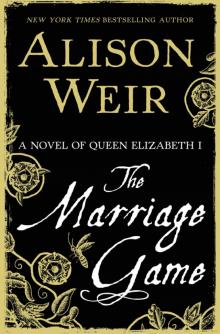 The Marriage Game
The Marriage Game A Dangerous Inheritance
A Dangerous Inheritance Katherine of Aragón: The True Queen
Katherine of Aragón: The True Queen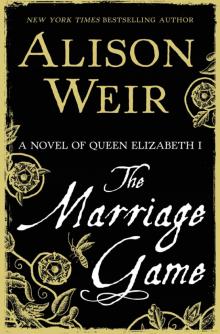 The Marriage Game: A Novel of Queen Elizabeth I
The Marriage Game: A Novel of Queen Elizabeth I Princes in the Tower
Princes in the Tower Anne Boleyn: A King's Obsession
Anne Boleyn: A King's Obsession Traitors of the Tower
Traitors of the Tower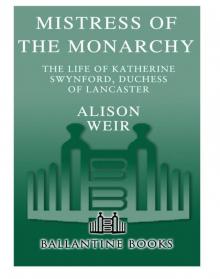 Mistress of the Monarchy: The Life of Katherine Swynford, Duchess of Lancaster
Mistress of the Monarchy: The Life of Katherine Swynford, Duchess of Lancaster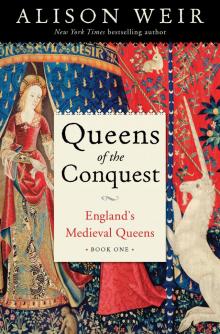 Queens of the Conquest: England’s Medieval Queens
Queens of the Conquest: England’s Medieval Queens Eleanor of Aquitaine: A Life
Eleanor of Aquitaine: A Life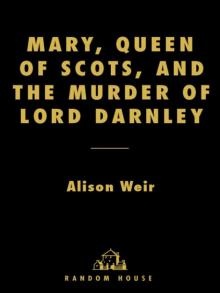 Mary, Queen of Scots, and the Murder of Lord Darnley
Mary, Queen of Scots, and the Murder of Lord Darnley Henry VIII: The King and His Court
Henry VIII: The King and His Court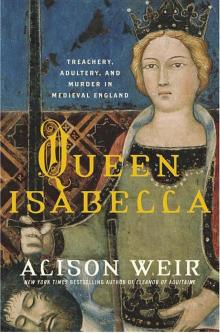 Queen Isabella: Treachery, Adultery, and Murder in Medieval England
Queen Isabella: Treachery, Adultery, and Murder in Medieval England Katheryn Howard, the Scandalous Queen
Katheryn Howard, the Scandalous Queen Arthur- Prince of the Roses
Arthur- Prince of the Roses The Wars of the Roses
The Wars of the Roses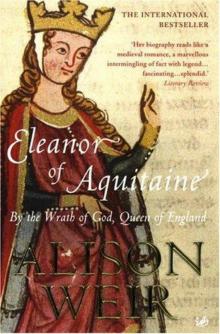 Eleanor of Aquitaine: By the Wrath of God, Queen of England
Eleanor of Aquitaine: By the Wrath of God, Queen of England Mary Boleyn: The Great and Infamous Whore
Mary Boleyn: The Great and Infamous Whore Jane Seymour: The Haunted Queen
Jane Seymour: The Haunted Queen Anna of Kleve, the Princess in the Portrait
Anna of Kleve, the Princess in the Portrait Lancaster and York: The Wars of the Roses
Lancaster and York: The Wars of the Roses The Grandmother's Tale
The Grandmother's Tale The Princess of Scotland (Six Tudor Queens #5.5)
The Princess of Scotland (Six Tudor Queens #5.5) The Lady Elizabeth
The Lady Elizabeth Katherine Swynford: The Story of John of Gaunt and His Scandalous Duchess
Katherine Swynford: The Story of John of Gaunt and His Scandalous Duchess The Curse of the Hungerfords
The Curse of the Hungerfords The Lost Tudor Princess: The Life of Lady Margaret Douglas
The Lost Tudor Princess: The Life of Lady Margaret Douglas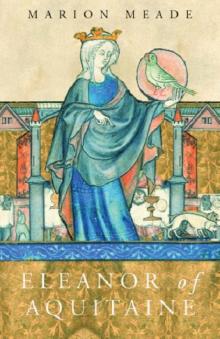 Eleanor of Aquitaine
Eleanor of Aquitaine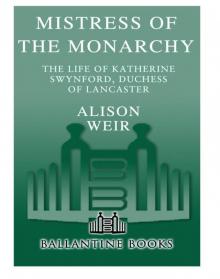 Mistress of the Monarchy
Mistress of the Monarchy The Lost Tudor Princess
The Lost Tudor Princess Henry VIII
Henry VIII Anne Boleyn, a King's Obsession
Anne Boleyn, a King's Obsession A Dangerous Inheritance: A Novel of Tudor Rivals and the Secret of the Tower
A Dangerous Inheritance: A Novel of Tudor Rivals and the Secret of the Tower Elizabeth of York
Elizabeth of York Katherine of Aragon, the True Queen
Katherine of Aragon, the True Queen Katherine Swynford
Katherine Swynford Wars of the Roses
Wars of the Roses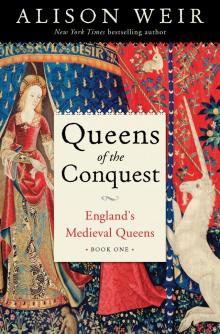 Queens of the Conquest
Queens of the Conquest Mary Boleyn
Mary Boleyn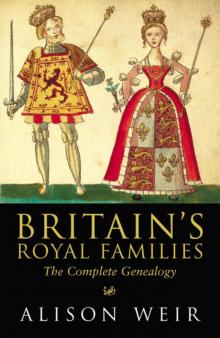 Britain's Royal Families
Britain's Royal Families The Tower Is Full of Ghosts Today
The Tower Is Full of Ghosts Today Life of Elizabeth I
Life of Elizabeth I Anne Boleyn A King's Obssession
Anne Boleyn A King's Obssession Lancaster and York
Lancaster and York Jane Seymour, the Haunted Queen
Jane Seymour, the Haunted Queen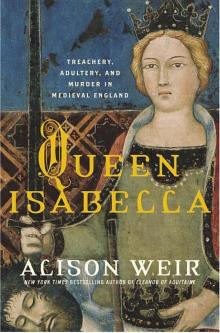 Queen Isabella
Queen Isabella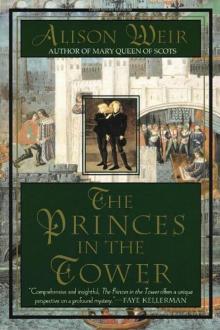 The princes in the tower
The princes in the tower